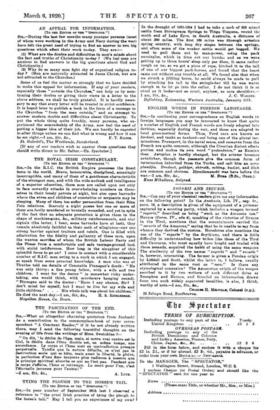THE ROYAL IRISH CONSTABULARY [To THE EDITOR or THE "
SPECTATOR "]
Sm.—III the R.I.C. the British Empire possesses the finest force in the world. Brave, honourable, disciplined. amazingly incorruptible, and many of them of a gentleness characteristic of the strongest men, and with the wide outlook and intelligence of a superior education, these men are called upon not only to face cowardly attacks in overwhelming numbers on them- selves in their lonely patrols at night, but also upon barracks where the wives and children of constables or sergeants may be sleeping. Many of them too suffer persecution from their Sinn Fein relations. Scarcely a night passes but one or more of them are foully murdered or brutally wounded, and yet in spite of the fact that no adequate protection is given them in the shape of machine-guns, &e., military reinforcements, and star signals (the latter, I hear, some barracks have at last), they remain absolutely faithful to their oath of allegiance—our one strong barrier against traitors and rebels. One is filled with admiration for the fidelity and gallantry of these men, upon the wanton eaeritee of whom the British Labour Party and the Times from a comfortable and safe vantage-ground look with stolid indifference. How long is the slaughter of this splendid force to go on? I come in contact with a considerable number of R.I.C. men owing to a work in which I am engaged, so speak from some personal knowledge. A man who was at Thurles told me details of Constable Finnegan's death: "He was only thirty; a fine young fellow, with a wife and two children. I went for the doctor" (a somewhat risky under- taking, one would think, with murderers hanging round). "Finnegan said to the doctor : 'Have I any chance, Sir P I don't mind for myself, but I want to live for my wife and little children.' . . . His whole talk was about his children."
He died the next day.—I am, Sir, &o., H. S. Rrensanson. Moyallion House, Co. Down.










































 Previous page
Previous page